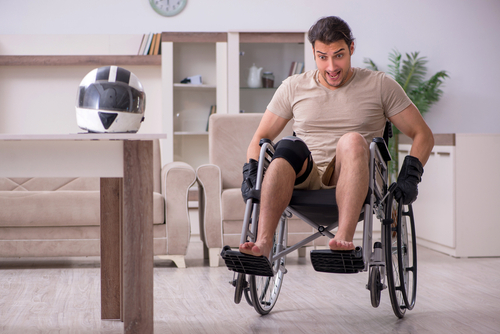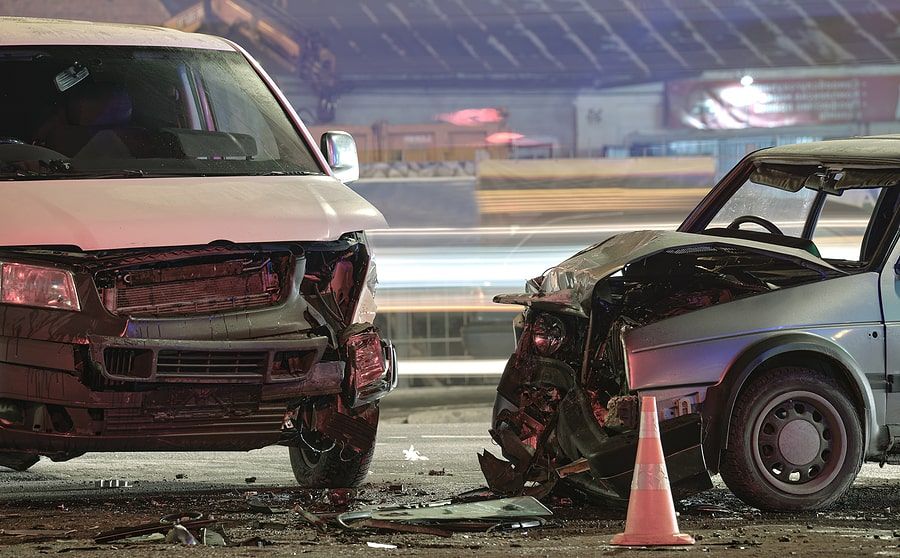Motorcycle accidents can be life-altering events, bringing sudden and unexpected changes to your life. On Long Island, where bustling roads like Sunrise Highway and the Long Island Expressway see a high volume of traffic, the risk of accidents is ever-present. If you’ve been involved in a motorcycle accident that has left you disabled, you may feel overwhelmed by the challenges ahead.
From managing physical pain to navigating financial burdens, the road to recovery can seem daunting. But there are actions you can take to rebuild your life through a motorcycle accident claim.
What Is Considered a Disability?
Disability resulting from a motorcycle accident can vary widely in scope and duration. It’s important to distinguish between temporary and permanent disabilities:

- Temporary Disabilities: These are conditions that impede your ability to perform certain tasks or activities for a limited period. Examples include fractures, soft tissue injuries, or minor head injuries. While temporary, these disabilities can still significantly impact your daily life and require time and resources to recover fully.
- Permanent Disabilities: These are long-term or lifelong conditions resulting from severe injuries such as spinal cord damage, traumatic brain injuries (TBI), or amputations. Permanent disabilities can drastically alter your lifestyle, requiring ongoing medical care, rehabilitation, and adaptations to your living environment.
Common Causes of Disabilities in Motorcycle Accidents
Motorcycle accidents can result from a variety of factors, many of which are preventable. Some common causes of motorcycle accidents include:
- Distracted Drivers: In areas like Sunrise Highway or the Long Island Expressway (LIE), distracted driving is a common hazard. Drivers who take their eyes off the road to text, eat, or engage with in-car technology can cause devastating collisions.
- Poorly Maintained Roads: Sections of Long Island, including areas like Montauk and Riverhead, may suffer from potholes, uneven surfaces, or inadequate signage. These road conditions can contribute to accidents, especially for motorcyclists who are more vulnerable to changes in the roadway.
- Faulty Motorcycle Parts: Manufacturing defects in motorcycles from brands like Harley-Davidson or Yamaha can lead to mechanical failures. A faulty brake system, tire blowouts, or engine malfunctions can cause riders to lose control and sustain serious injuries.
How Disability Can Affect Your Life
A disability resulting from a motorcycle accident can have profound effects on various aspects of your life:
- Mobility Challenges: Simple movements that were once effortless can become painful or impossible. Navigating stairs, driving a vehicle, or even walking short distances may require assistance or adaptive devices.
- Employment and Financial Strain: Inability to work or reduced earning capacity can lead to significant financial stress. Long Island’s diverse economy, with industries such as construction, fishing, and tourism, may offer limited opportunities for those unable to perform physically demanding jobs.
- Daily Tasks and Independence: Everyday activities like cooking, cleaning, and personal care may become challenging. This loss of independence can affect your self-esteem and overall quality of life.
- Emotional and Psychological Impact: Coping with a disability can lead to feelings of frustration, anxiety, depression, and PTSD. The emotional toll extends to family members who may take on caregiving roles, adding to the household’s stress.
Financial Challenges After a Motorcycle Accident
Facing a disability after a motorcycle accident can lead to significant financial burdens, affecting every aspect of your life.
Medical Expenses
The cost of medical care following a motorcycle accident can be overwhelming:
- Surgeries and Hospital Stays: Major surgeries, extended hospitalizations, and intensive care can quickly accumulate significant medical bills.
- Therapy and Medications: Ongoing physical therapy, prescription medications, and medical supplies add to the financial burden.
Lost Income and Future Earnings
Disability can severely impact your ability to work, leading to:
- Immediate Loss of Income: Inability to perform your job due to injury can result in a sudden loss of income, making it difficult to cover everyday expenses.
- Reduced Earning Capacity: Even after recovering, you may not be able to return to your previous job or earn the same level of income, affecting your long-term financial stability.
Ongoing Costs of Living with a Disability
Adapting to a new way of living involves various ongoing expenses:
- Home and Vehicle Modifications: Installing ramps, widening doorways, or modifying bathrooms can make your home more accessible but can be costly.
- Caregiver Expenses: Hiring professional caregivers or paying for in-home assistance to help with daily tasks adds to your financial obligations.
These services and modifications and services are essential for maintaining your independence and quality of life but can strain your budget significantly.
Compensation Options for Disabled Victims of Motorcycle Accidents
If another person or party’s negligence caused your motorcycle accident, you may have the right to seek compensation through a personal injury claim. By filing a claim, you can pursue reimbursement for medical expenses, lost income, pain and suffering, and other damages related to your injury. Holding the at-fault party accountable not only helps you recover financially but also promotes a sense of justice after the accident.
How a Lawyer Can Help with a Motorcycle Accident Claim
Handling a motorcycle accident claim, especially when you’re dealing with a disability, can be overwhelming. The legal process often involves complex paperwork, strict deadlines, and negotiations with insurance companies that may undervalue or deny your claim. An experienced motorcycle accident lawyer can make a significant difference, ensuring your rights are protected and maximizing your chances of receiving the compensation you deserve.
Investigating the Accident
A lawyer can conduct a thorough investigation to establish liability and gather evidence to support your claim. This can includes:
- Reconstructing the Accident: Working with accident reconstruction experts to determine how the crash occurred and who is at fault.
- Collecting Key Evidence: Gathering police reports, medical records, photos of the accident scene, and witness statements.
- Identifying Negligence: Pinpointing instances of negligence, such as distracted driving on the Long Island Expressway or defective motorcycle parts.
By building a strong case, your lawyer can clearly demonstrate how another party’s actions caused your injuries.
Handling Insurance Companies
Dealing with insurance companies can be one of the most challenging aspects of a claim. Insurance adjusters often aim to minimize payouts, and their tactics can be intimidating. A lawyer can:
- Negotiate on Your Behalf: Ensure the insurance company offers a fair settlement that reflects the full extent of your medical expenses, lost wages, and other damages.
- Communicate with Insurers: Prevent you from saying anything that could jeopardize your claim.
- Challenge Denials: If your claim is denied, your Long Island motorcycle accident lawyer can file an appeal and fight for your rights.
With legal representation, you can avoid being taken advantage of during this critical time.
Calculating the Value of Your Claim
Accurately valuing your claim is essential to ensure you receive adequate compensation. A lawyer will consider:
- Current and Future Medical Costs: Including surgeries, physical therapy, assistive devices, and home modifications.
- Lost Income and Reduced Earning Capacity: Accounting for both immediate lost income and long-term impacts on your ability to work.
- Non-Economic Damages: Such as pain and suffering, emotional distress, and loss of enjoyment of life.
Your lawyer will fight to recover the full range of damages available to you under New York law.
Representing You in Court
While many motorcycle accident claims are settled outside of court, some may require litigation. An experienced lawyer will:
- Prepare Your Case for Trial: Develop a compelling argument supported by evidence and expert testimony.
- Advocate for You in Court: Present your case effectively to a judge and jury.
- Handle Complex Legal Procedures: Ensure all filings, deadlines, and courtroom protocols are followed correctly.
Having a lawyer by your side demonstrates to insurance companies and opposing parties that you’re prepared to take your case to court if necessary, which can lead to better settlement offers.
Providing Emotional Support and Guidance
Beyond legal expertise, a lawyer offers emotional support during a difficult time. They’ll help you navigate the process with confidence, keeping you informed at every step and ensuring you feel heard and understood.
After a motorcycle accident, you deserve to focus on your recovery—not on the legal complexities of pursuing a claim. An experienced Long Island motorcycle accident lawyer can alleviate the burden, protect your rights, and help you achieve the financial security you need to move forward. Whether negotiating with insurance companies or advocating for you in court, their support is a critical asset in the pursuit of justice.
Medical Care and Rehabilitation Options on Long Island

After a motorcycle accident, seeking immediate medical attention is crucial, even if your injuries seem minor at first. On Long Island, several top-tier medical facilities can provide the necessary care, including:
- Stony Brook University Hospital: Located in Stony Brook, this hospital offers comprehensive trauma care and specializes in treating severe injuries.
- Nassau University Medical Center: Situated in East Meadow, this center is equipped with advanced medical technology and experienced professionals to address a wide range of injuries.
Recovering from a serious injury often requires extensive rehabilitation. Long Island offers numerous resources to support your physical and emotional healing, including:
- Peconic Bay Medical Center: Known for its exceptional physical therapy programs, this center in Riverhead helps patients regain strength and mobility through personalized treatment plans.
- Emotional Support Services: Mental health is a critical component of recovery. Facilities in Garden City and Smithtown provide counseling and therapy services to help you cope with the emotional aftermath of an accident.
Timely medical intervention and regular rehabilitation can prevent complications, improve recovery outcomes, and provide documentation of your injuries for any potential legal claims.
FAQs About Disability After a Motorcycle Accident
Here are some answers to frequently asked questions regarding disability after a motorcycle accident:
How Long Do I Have to File a Claim in New York?
In New York, the statute of limitations for filing a personal injury claim is generally three years from the date of the accident. This means you have three years to initiate legal action against the party responsible for your injuries. However, exceptions can apply depending on the specifics of your case.
For example, if a government entity is involved, you may face much shorter deadlines, such as filing a notice of claim within 90 days. Acting promptly is crucial to preserve your right to compensation, as missing the deadline typically means forfeiting your ability to seek damages.
Can I Sue if I Was Partially at Fault?
Yes, you can still file a claim if you were partially at fault for the accident, thanks to New York’s comparative negligence rules. Under this system, your compensation will be reduced by the percentage of fault assigned to you. For instance, if you were found to be 20% at fault for the accident, you would still be eligible to recover 80% of the damages.
This approach allows injured individuals to pursue compensation even in complex cases where liability is shared. An experienced attorney can help minimize your share of fault and maximize your recovery.
What Should I Do if the Insurance Company Denies My Claim?
If your insurance company denies your claim, it’s important not to give up, as denials are not always the final word. First, review the denial letter carefully to understand the reasons behind the decision. Gather additional evidence, such as medical records, accident reports, or witness statements, to strengthen your case. You can then appeal the denial by providing this evidence and addressing the insurer’s concerns. If the company remains uncooperative, consulting with an attorney can help, as they can negotiate on your behalf or take legal action to ensure you receive the compensation you deserve.
How Legal Representation Can Help You Move Forward
Facing a disability after a motorcycle accident is undoubtedly challenging, but you don’t have to go through it alone. Legal representation can provide the experience and support needed to secure the compensation you deserve, alleviating financial stress and allowing you to focus on your recovery.
At Rosenberg & Gluck, LLP, we’ve dedicated decades to helping injured clients across Long Island navigate the complexities of personal injury law. Our compassionate and experienced team understands the unique challenges you face and is committed to advocating for your rights.
Whether your accident occurred near Huntington, Patchogue, or any other part of Long Island, we are here to support you every step of the way. Contact us today at (631) 451-7900 or through our online form for a free consultation to explore your legal options.









